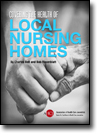Tag
washington
-
•
Old, frail fall through the cracks in Wash. system
In a series of articles, Seattle Times reporter Michael J. Berens looks at Washington’s adult family homes – legally sanctioned…

-
•
Reporter honored for story on mental health system
Carol Smith, formerly of the Seattle Post-Intelligencer, won a 2009 Casey Medals for Meritorious Journalism. The contest, presented by the…


